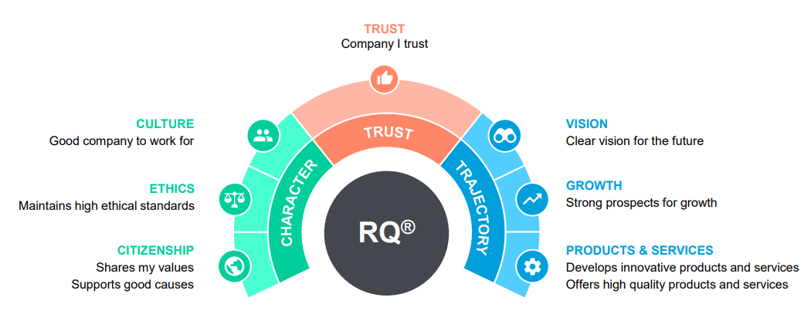Preserving Your Brand: A Guide to Reputation Management


Published on: June 21, 2023
Whether buying a new car or choosing which sparkling water to drink, a brand’s reputation influences consumer decisions. A positive reputation leads to increased trust, brand loyalty, and sustained growth. So, how do you earn a positive reputation? Using examples from the 2023 Axios Harris Poll’s 100 most-visible brands, we’ll break down the seven dimensions of the Reputation Quotient (RQ®) and how they can be used to maintain your company’s reputation.
What is reputation management?
At its core, reputation management involves actively shaping and maintaining the perception of a company's brand, values, and actions. It encompasses the overall impression a company leaves on its employees, customers, investors, and the general public. For this reason, it plays a crucial role in the success and longevity of any organization. According to the Harris Poll, brand reputation can be broken down into three main categories: character, trust, and trajectory.

Character
Character refers to the moral and ethical foundation of a company. By establishing a strong character, a company can foster trust, inspire loyalty, and attract like-minded individuals. Enhancing a company’s character depends on both internal and external perceptions, and involves citizenship, ethics, and culture.
Demonstrating social responsibility and contributing positively to society strengthens the perception of your company's character. Leading the way in RQ® scores, Patagonia prides itself on activating change through environmental and humanitarian efforts, including being a founding member of the Fair Labor Association. The brand consistently ranks favorably among consumers because they believe in the company's mission to create a sustainable future.
Have you ever heard the saying, "bad company corrupts good character?" The same applies in business. Companies should be mindful of the partnerships and affiliations they maintain. Collaborating with reputable organizations and industry leaders adds to your credibility, while having ties with businesses that have questionable practices and don't meet your level of standards will hurt your character and reputation score.
Company culture is another major component of character. Keep in mind that your employees will always be your biggest advocates. By seeking satisfaction rates and input through regular surveys and collaborative meetings, employees feel heard and have a stronger sense of belonging to their company. The key is to actively make changes as necessary, being willing to adjust strategies and processes for the greater good. Companies that go a step further are the ones that truly shine. Creating events that establish community within the workplace can vastly improve your internal reputation, because it shows you truly care about your employees as people.
Trust
Trust is the cornerstone of any successful business relationship. It involves instilling confidence in stakeholders that your company will act responsibly, ethically, and in their best interests. One way to help ensure this is to establish robust internal structures for accountability and transparency to prevent untrustworthy actions and ensure that your company operates with integrity.
An unfortunate example of lost trust is Wells Fargo who, since their scandal in 2016, has struggled to regain a positive perception with consumers. After it was revealed on national news that the company have been overpromising, using false records and even misusing customer personal records to reach unattainable goals for more than a decade, customers quickly pulled their accounts, sending Wells Fargo into near bankruptcy. Although they accepted full responsibility, Wells Fargo was still enduring court cases and ongoing settlements throughout 2020, keeping their negligence at the top of consumers’ minds to this day. They serve as a bleak reminder that once trust is broken, it can be difficult to earn back.
However, a great way to retain trust is through exceptional customer service. By promptly addressing concerns, resolving issues, and demonstrating a genuine commitment to customer satisfaction, it fosters confidence and builds trust. Take Amazon, for example. Year after year, they’re a high-ranking company, because they deliver convenient solutions and are reliable. They also make it easy for consumers to play a part in selling and make a profit themselves, showing even further investment in their customers’ benefit.
Trajectory
Trajectory refers to the path a company is on and its ability to adapt and grow in a rapidly evolving market. It involves staying relevant, innovative, and responsive to changing industry dynamics. One way to display a healthy trajectory is by engaging in discussions around relevant topics and trends within your industry. Showcasing your insights and care for adaptability positions your company as forward-thinking and knowledgeable.
However, it’s better to walk the walk and put those conversations into practice. Embrace innovation by incorporating new strategies and practices to stay modern and relevant. Continuously research and implement emerging technologies, trends, and consumer preferences in your industry to avoid becoming stagnant or obsolete.
Take Apple, for example. When they bought Beats headphones in 2014, capitalizing on an already popular product, Sony wasn’t far behind with their own version of wireless, noise-canceling headphones. Yet despite Sony, IBM, DELL, and other tech companies being leaders in the market, Apple’s famous commitment to innovation has helped them surpass their competitors, breaking into the top 10 in 2023.
Speaking of products, it’s crucial to pay close attention to customer feedback, especially when it comes to product and service effectiveness. Swiftly address concerns and rectify issues to demonstrate your commitment to continuous improvement in your products and services. While it’s better to be proactive, being efficiently and effectively reactive can help improve a company’s trajectory as well. As long as consumers can see continued improvements and growth, they’ll know that your company is at least moving in the right direction.
Conclusion
A strong reputation is not only a valuable asset, but also a reflection of your company's values and commitment to excellence. By mindfully managing how your company appears both internally and externally, actively engaging with stakeholders, and staying attuned to trends, you can build and maintain a positive reputation that sets your company up for long-term success.
Explore the latest B2B topics and gain insight to adapt best practices for success and help grow your business.
If you step back and look at your content—blogs, videos, sales assets, social posts—would you see a connected story, or a collection of one-off...
MoreEver feel like your buyer personas are useless? You’re not alone. Too many B2B marketers rely on demographic snapshots—age, job title, geography—to...
More2026 isn’t just another year of more tech and more automation. It’s the year B2B marketing gets human again. While AI and analytics will dominate...
MoreComplete the form below and we’ll get in touch with you right away.
You are now in accessibility mode. To restore settings to default, click the accessibility icon on the right hand side.